选修八unit5语法
选修八unit5语法
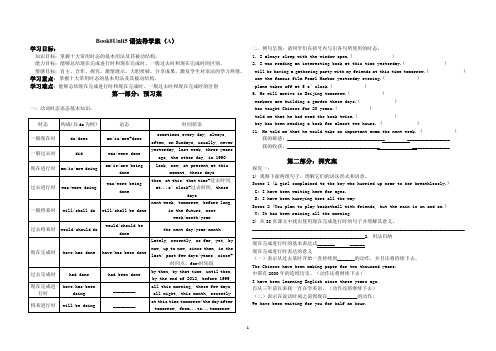
Book8Unit5语法导学案(A)学习目标:知识目标:掌握十大常用时态的基本用法及其被动结构。
能力目标:能够总结现在完成进行时和现在完成时、一般过去时和现在完成时的区别。
情感目标:自主、合作、探究,激情展示,大胆质疑,分享成果。
激发学生对语法的学习热情。
学习重点:掌握十大常用时态的基本用法及其被动结构。
学习难点:能够总结现在完成进行时和现在完成时、一般过去时和现在完成时的区别第一部分:预习案一:动词时态语态基本知识:二.例句呈现:请同学们在括号内写出各句所使用的时态。
1. I always sleep with the window open.( )2. I was reading an interesting book at this time yesterday.( )will be having a gathering party with my friends at this time tomorrow.( ) saw the famous film Pearl Harbor yesterday evening.( )plane takes off at 5 o’clock.( )6. He will arrive in Beijing tomorrow.( )workers are building a garden these days.( )has taught Chinese for 20 years.( )told me that he had read the book twice.( )boy has been reading a book for almost two hours. ( )11. He told me that he would take an important exam the next week. ( )我的疑惑:_______________________________________ _________________ 我的收获:_____________________________________ _______________第二部分:探究案探究一:1) 观察下面两组句子,理解它们的语法形式和语意。
人教版高中英语选修八 Unit5 Meeting your ancestors-语法篇(教师版)
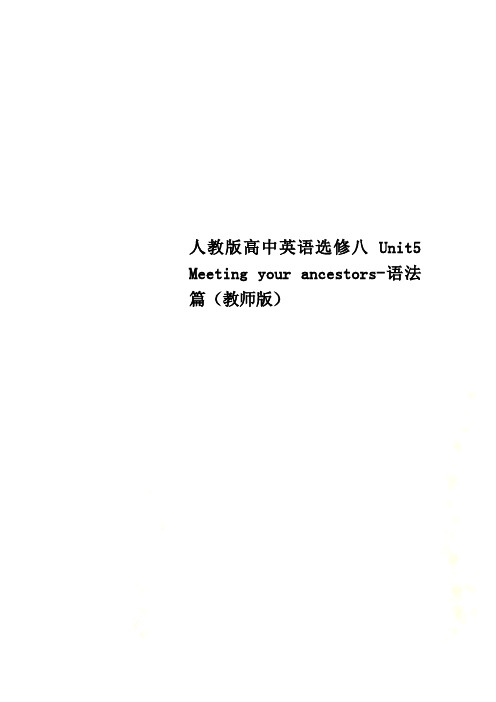
人教版高中英语选修八 Unit5 Meeting your ancestors-语法篇(教师版)第10讲Meeting your ancestors 语法篇____________________________________________ __________________________________________________________________________________ ______________________________________1.掌握现在完成进行时的用法;2.能够区分现在完成时与现在完成进行时。
现在完成进行时(1)结构由“have/has been+动词的现在分词”构成,表示从过去某时开始,一直持续到现在的动作,可能刚刚停止,也可能还在继续进行。
例如:We have been looking for you for an hour.我们找了你一个小时。
(动作刚停止)She has been teaching English since she graduated.她毕业后一直在教英语。
(动作还在继续进行)We have been going over maths these days.我们这些天一直在复习数学。
(动作还在继续进行)(2)有时现在完成进行时不是指某动作一直在不停的进行,而是表示一直到说话时为止的一段时间内一再重复的动作,常常带有感情色彩。
例如:She has been saying that 20 times. 这话她已经说了I have watered the flowers.我已经给花浇过水了。
(已完成:你不必浇了)I have been watering the flowers.我一直在给花浇水。
(未完成:一直在浇)其二:状态动词、知觉动词或情感动词如:see, feel,know,love 等,不可用于现在完成进行时,但可用于现在完成时,例如:I have known her for a long time.我认识她已经很久了。
新课标人教版选修八Book8 Unit5 using language
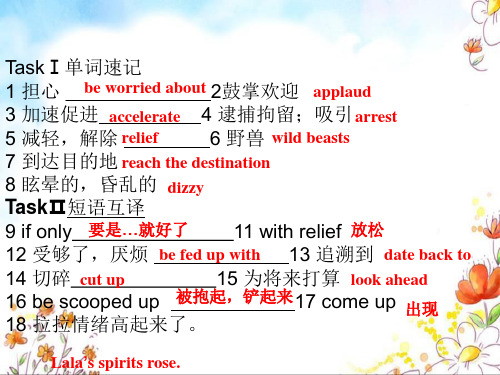
A: I really appreciate your help. I ut you. 我真的很感激有你的帮助。没有你我永远也不会成功。 B: Don’t mention it. It’s my pleasure. 不必客气。这是我的荣幸。
3 她猛得坐下,结果却被她那大笑大叫的妹妹搂抱起来。
Abruptly she sat down, only to be scooped up by her laughing, shouting sister.
only to 引导的非谓语动词短语作状语,表示意料之外的结果。 4.快到达目的地的时候,一阵香气扑鼻,她停下来,不往前 走了。
If only 引导虚拟语气的句子, 意思是:要是…就好了
练习
1.The little baby arrested the little girl’s attention.
AAD
Don’t mention it. 不必客气。 【疯狂短评】 当中国人对你致以谢意的时候,我们都知道该说声“不用 谢”;但当外国人对你说“Thank you”时,你就不能 以“no thank you”来回应了,而应该说“Don’t mention it”或“You’re welcome”、“ Sure”、“My pleasure”、“Forget it”,这些都是口语要素的精髓。 “appreciate”是“感谢;感激”的意思,它用来表示 比较正式的感谢。
TaskⅠ单词速记 1 担心 be worried about 2鼓掌欢迎 applaud 3 加速促进 accelerate 4 逮捕拘留;吸引 arrest 5 减轻,解除 relief 6 野兽 wild beasts 7 到达目的地 reach the destination 8 眩晕的,昏乱的 dizzy TaskⅡ短语互译 9 if only 要是…就好了 11 with relief 放松 12 受够了,厌烦 be fed up with 13 追溯到 date back to 14 切碎 cut up 15 为将来打算 look ahead 16 be scooped up 被抱起,铲起来 17 come up 出现 18 拉拉情绪高起来了。
新课标人教版选修八Book8 Unit5 Language points
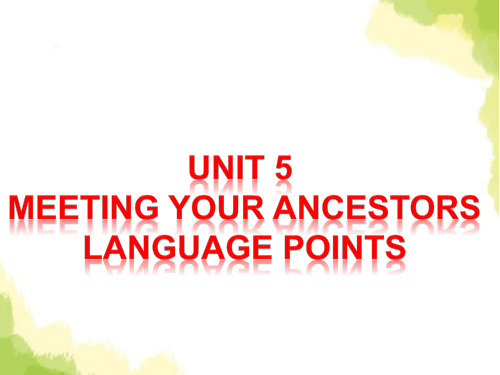
--- 周末有空吗? --- 对不起, 我有大量的事要做 — Are you free this weekend? — I’m sorry, but l have lots of work to do.
His research was interrupted by war.
8. 他们用这火取暖、做饭, 还能用火吓 跑野兽。 That would have kept them warm, cooked the food and scared wild beasts away as well. 1) would 表示猜测, 译为 “想必……”、 “肯定会……”。
2) keep them warm为keep+宾语+宾语 补足语的结构意为 “使......处于某种状 态(情况)”。用作宾语补足语常见的 词有现在分词、过去分词、形容词、副 词以及介词短语。 他使我等了半个小时。 He kept me waiting for half an hour.
3. 我们在山的比较高的洞穴里发现了动 物和人类的骨头以及工具和其他物品。
We have found human and animal bones in those caves higher up the hill as well as tools and other objects.
as well as 1) conj. as well as 可以用来连接两个相 同的成分, 如名词, 形容词, 动词, 介词, 通 常不位于句首。意为“不但......而且”。
b. 句中 “ which” 用来引导非限制性定语 从句, 先行词为其前的句子。 c. suggest vt. to make evident indirectly; imply 意为“暗示, 意味, 表明” 她苍白的脸色表明她病了。 Her pale face suggests that she was ill.
人教版高二英语选修8带例句单词短语训练:Unit 5 Meeting your ancestors
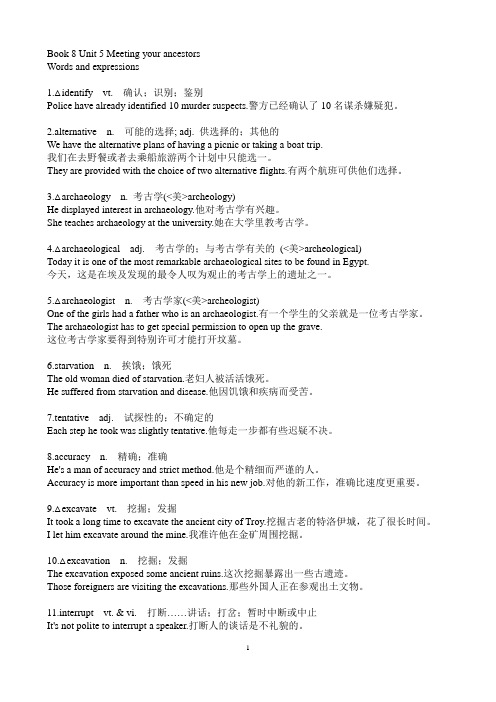
Book 8 Unit 5 Meeting your ancestorsWords and expressions1.△identify vt. 确认;识别;鉴别Police have already identified 10 murder suspects.警方已经确认了10名谋杀嫌疑犯。
2.alternative n. 可能的选择; adj. 供选择的;其他的We have the alternative plans of having a picnic or taking a boat trip.我们在去野餐或者去乘船旅游两个计划中只能选一。
They are provided with the choice of two alternative flights.有两个航班可供他们选择。
3.△archaeology n. 考古学(<美>archeology)He displayed interest in archaeology.他对考古学有兴趣。
She teaches archaeology at the university.她在大学里教考古学。
4.△archaeological adj. 考古学的;与考古学有关的(<美>archeological)Today it is one of the most remarkable archaeological sites to be found in Egypt.今天,这是在埃及发现的最令人叹为观止的考古学上的遗址之一。
5.△archaeologist n. 考古学家(<美>archeologist)One of the girls had a father who is an archaeologist.有一个学生的父亲就是一位考古学家。
The archaeologist has to get special permission to open up the grave.这位考古学家要得到特别许可才能打开坟墓。
高中英语选修8Unit5知识点
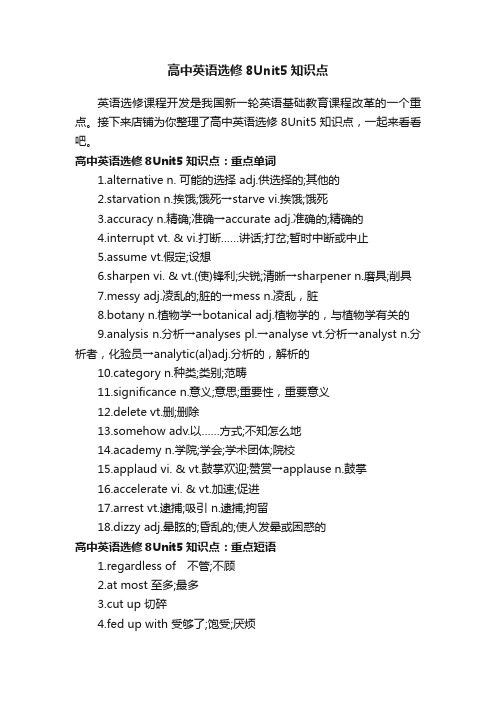
高中英语选修8Unit5知识点英语选修课程开发是我国新一轮英语基础教育课程改革的一个重点。
接下来店铺为你整理了高中英语选修8Unit5知识点,一起来看看吧。
高中英语选修8Unit5知识点:重点单词1.alternative n. 可能的选择 adj.供选择的;其他的2.starvation n.挨饿;饿死→starve vi.挨饿;饿死3.accuracy n.精确;准确→accurate adj.准确的;精确的4.interrupt vt. & vi.打断……讲话;打岔;暂时中断或中止5.assume vt.假定;设想6.sharpen vi. & vt.(使)锋利;尖锐;清晰→sharpener n.磨具;削具7.messy adj.凌乱的;脏的→mess n.凌乱,脏8.botany n.植物学→botanical adj.植物学的,与植物学有关的9.analysis n.分析→analyses pl.→analyse vt.分析→analy st n.分析者,化验员→analytic(al)adj.分析的,解析的10.category n.种类;类别;范畴11.significance n.意义;意思;重要性,重要意义12.delete vt.删;删除13.somehow adv.以……方式;不知怎么地14.academy n.学院;学会;学术团体;院校15.applaud vi. & vt.鼓掌欢迎;赞赏→applause n.鼓掌16.accelerate vi. & vt.加速;促进17.arrest vt.逮捕;吸引 n.逮捕;拘留18.dizzy adj.晕眩的;昏乱的;使人发晕或困惑的高中英语选修8Unit5知识点:重点短语1.regardless of 不管;不顾2.at most 至多;最多3.cut up 切碎4.fed up with 受够了;饱受;厌烦5.look ahead 向前看;为将来打算6.date back 追溯到……7.arrest sb. for... 因……而逮捕某人8.with relief 欣慰地9.be proud of... 以……为骄傲10.turn to sb. for help 向某人求助高中英语选修8Unit5知识点:重点句型1.If only it could be just like last year! 要是能跟去年那样有多好呀!2.It is agreat pleasure to meet you students from England...见到你们这些来自英国的学生非常高兴……3.It must have been very uncomfortable.那肯定会非常不舒服。
2020年高考英语一轮复习:选修八 Unit 5 Meeting your ancestors
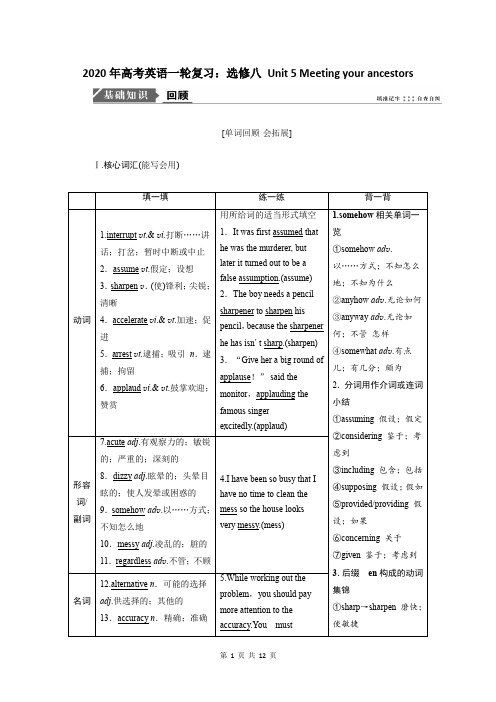
2020年高考英语一轮复习:选修八Unit 5 Meeting your ancestors[单词回顾·会拓展]Ⅰ.核心词汇(能写会用)1.somehow相关单词一览①somehow ad v.以……方式;不知怎么地;不知为什么②anyhow ad v.无论如何③anyway ad v.无论如何;不管怎样④somewhat ad v.有点儿;有几分;颇为2.分词用作介词或连词小结①assuming 假设;假定②considering 鉴于;考虑到③including 包含;包括④supposing 假设;假如⑤provided/providing 假设;如果⑥concerning 关于⑦given 鉴于;考虑到3.后缀en构成的动词集锦①sharp→sharpen 磨快;使敏捷1.tentative adj .试探性的;不确定的 2.ample adj .足够的;充足的;富裕的 3.primitive adj .原始的;远古的;简陋的 4.category n .种类;类别;范畴 5.receptionistn .接待员;招待员 6.yogurt n .酸乳酪;酸奶 7.wrinkle n .皱纹8.pulse v i .强烈而有规律地跳动;搏动 n .脉搏;节拍 9.howl v t .& v i .嗥叫;叫喊;吼叫 n .长嚎;嗥叫 语境串联Mr.Brown ,an acute politician ,gave a significant speech that a lot of poor people have no alternative but to starve to death and regardless of others ,rich people should help improve their messy living conditions.He was interrupted by the audience applauding from time to time.Assuming that if all of us do such things in a systematic way ,we 'll accelerate the development of society.[短语再现·能应用]college student!”However,looking ahead,he has no alternative but to prepare for the coming College Entrance Examinations.Fed up with doing lots of exercises every day regardless of a lot of difficulties,he knows he has to accelerate his walk to revision.His parents both applaud him and are proud of him.[句型重温·巧仿写]教材情景导入01语法填空A group of students from England has come to theZhoukoudian caves for a visit.An archaeologist 1.is showing(show) them round.The archaeologists 2.have been excavating(excavate) here for many years.After finding human and animal bones 3.in those caves higher up the hill as well as tools and other objects assume discovered fireplaces in the centre of the caves 5.where they constructed fires.Some evidence suggests 6.that our ancestors did wear clothes 7.made (make) from animal skins.The archaeologist also shows the students a primitive necklace 8.preserved (preserve) quite well.Indeed analysis has been 9.specially(special) showing us fields around here used to be part of a large shallow假定/假设某人/某事为……assume that... 假定/假设……It is assumed that... ……被认为(2)assumption n. 假定;假设make an assumption 认为;假定on the assumption that 假定(3)assuming (that)... 假设/假定……①Don't assume it is OK to be rude if the person you're in touch with won't recognize you. 不要主观地认为如果你正在接触的人认不出来你,你就可以粗鲁。
选修8unit5知识点汇总
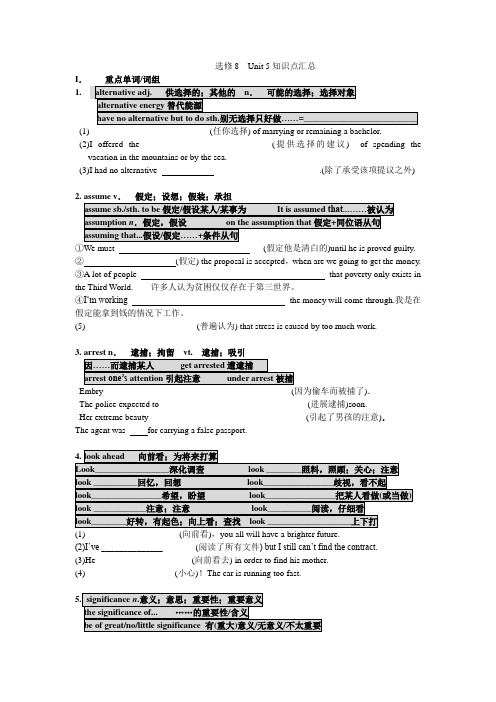
选修8 Unit 5知识点汇总I.1.(1)___________________________ (任你选择) of marrying or remaining a bachelor.(2)I offered the _____________________________(提供选择的建议) of spending thevacation in the mountains or by the sea.(3)I had no alternative ________________________.(除了承受该项提议之外)①We must ___(假定他是清白的)until he is proved guilty.②(假定) the proposal is accepted,when are we going to get the money.③A lot of people that poverty only exists in the Third World. 许多人认为贫困仅仅存在于第三世界。
④I‘m working the money will come through.我是在假定能拿到钱的情况下工作。
(5)_________________________ (普遍认为) that stress is caused by too much work.Embry __________________________________________ (因为偷车而被捕了).The police expected to _________________________________ (进展逮捕)soon.Her extreme beauty ___________________________________ (引起了男孩的注意).The agent was for carrying a false passport.(1)_____________________ (向前看),you all will have a brighter future.(2)I’ve _____________________ (阅读了所有文件) but I still can’t find the contract.(3)He _____________________ (向前看去) in order to find his mother.(4)____________________ (小心)!The car is running too fast.be significant=be of significance 有意义significantly adv.重大地;有意义地①This new discovery of oil is (有着重大的意义) to this area's economy.②Please inform us if there are any (重大)changes in your plans.6. relief n.much to one’s relief =to one’s great relief使某人大为放心的是,使某人深感宽慰的是provide relief for sb 为。
人教版选修八Unit 5 语法学案
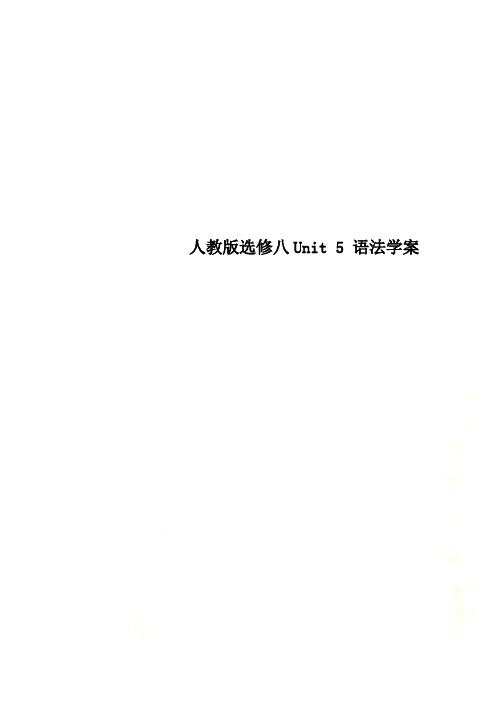
人教版选修八Unit 5 语法学案Book 8 Unit 5 GrammarThe present perfect continuous tense----现在完成进行时1 定义: 一般表示动作从过去某一时间可是一直延续到现在,现在这个动作可能刚刚终止,也可能仍然在进行着。
2 现在完成进行时的构成:现在完成进行时是由“have/has+been+动词的现在分词”构成3 现在完成进行时的基本句型:肯定式have \ has been V.ing疑问式Have \ Has sb. been V.ing?简略回答Yes,sb. have\ has . No,sb. haven't\ hasn't4 现在完成时的用法1)在强调指出动作还未结束,还要继续下去。
如:I've been reading this book for two hours,but I haven't finished it. 这本书我已读了两个小时了,但我还没读完。
2)强调动作延续时间的长久或带感情色彩。
She has always been working like that她一贯是这样工作的。
3)现在完成进行时也可表示现在以前这段时间反复发生的事情。
We've been seeing quite a lot of each other recently.最近我们经常见面。
5 现在完成时和现在完成进行时的区别(1) 现在完成时的“已完成”用法强调动作的完成,而现在完成进行时表示动作未完成。
试分析:I’ve been waiting for a long time.He’s been sitting here all morning.(6) 有些表示状态,感情,感觉的动词如:have,exist,like,hate,hear,know,sound等动词不能用于现在完成进行时,但可用于现在完成时。
选修八unit5知识点
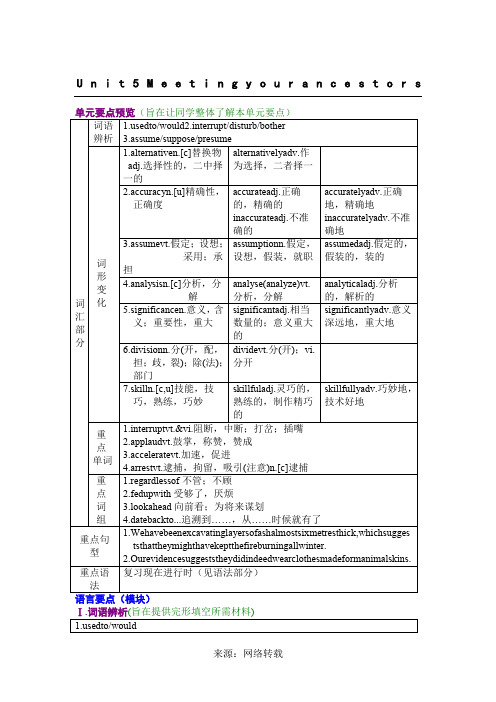
U n i t5M e e t i n g y o u r a n c e s t o r s 单元要点预览(旨在让同学整体了解本单元要点)词汇部分词语辨析edto/would2.interrupt/disturb/bother3.assume/suppose/presume词形变化1.alternativen.[c]替换物adj.选择性的,二中择一的alternativelyadv.作为选择,二者择一2.accuracyn.[u]精确性,正确度accurateadj.正确的,精确的inaccurateadj.不准确的accuratelyadv.正确地,精确地inaccuratelyadv.不准确地3.assumevt.假定;设想;采用;承担assumptionn.假定,设想,假装,就职assumedadj.假定的,假装的,装的4.analysisn.[c]分析,分解analyse(analyze)vt.分析,分解analyticaladj.分析的,解析的5.significancen.意义,含义;重要性,重大significantadj.相当数量的;意义重大的significantlyadv.意义深远地,重大地6.divisionn.分(开,配,担;歧,裂);除(法);部门dividevt.分(开);vi.分开7.skilln.[c,u]技能,技巧,熟练,巧妙skillfuladj.灵巧的,熟练的,制作精巧的skillfullyadv.巧妙地,技术好地重点单词1.interruptvt.&vi.阻断,中断;打岔;插嘴2.applaudvt.鼓掌,称赞,赞成3.acceleratevt.加速,促进4.arrestvt.逮捕,拘留,吸引(注意)n.[c]逮捕重点词组1.regardlessof不管;不顾2.fedupwith受够了,厌烦3.lookahead向前看;为将来谋划4.datebackto...追溯到……,从……时候就有了重点句型1.Wehavebeenexcavatinglayersofashalmostsixmetresthick,whichsugges tsthattheymighthavekeptthefireburningallwinter.2.Ourevidencesuggeststheydidindeedwearclothesmadeformanimalskins.重点语法复习现在进行时(见语法部分)语言要点(模块)Ⅰ.词语辨析(旨在提供完形填空所需材料) edto/would【解释】would与usedto都可用来表示过去经常性或习惯性的动作。
【名校精品】高中英语复习资料(人教版):第一部分 选修八 Unit 5
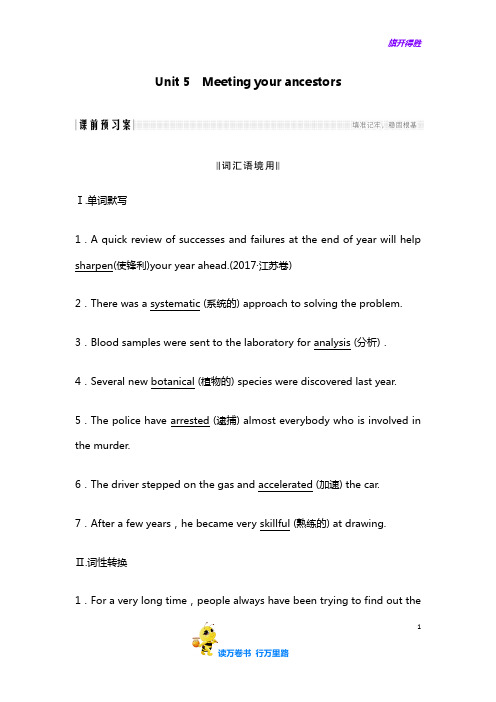
Unit 5Meeting your ancestorsⅠ.单词默写1.A quick review of successes and failures at the end of year will help sharpen(使锋利)your year ahead.(2017·江苏卷)2.There was a systematic (系统的) approach to solving the problem. 3.Blood samples were sent to the laboratory for analysis (分析).4.Several new botanical (植物的) species were discovered last year.5.The police have arrested (逮捕) almost everybody who is involved in the murder.6.The driver stepped on the gas and accelerated (加速) the car. 7.After a few years,he became very skillful (熟练的) at drawing.Ⅱ.词性转换1.For a very long time,people always have been trying to find out the1significance (significant) of life.2.The old man was starved to death.People felt pity for his starvation.(starve)3.The war interrupted the trade between the two countries and the interruption lasted ten years.(interrupt)4.The figures should be accurate,__for all the decisions will be based on the accuracy.(accurate)5.They divided the whole country into three parts and the division had great influence on the culture and history.(divide)6.I have been so busy that I have no time to clean the mess,__so the house looks very messy.(mess)7.It was assumed that he was the murderer,but later it turned out to be a false assumption.(assume)8.“Give her a big round of applause!” said the monitor,applauding the famous singer excitedly.(applaud)9.You don’t need an identity,and all you need is proper identification so that the guards can identify you.(identify)2Ⅲ.短语填空1.He continued speaking,regardless__of (不顾) my feelings on the matter.2.Chinese currency can date__back__to (追溯到) two thousand years ago.3.Cut__up (切碎) the meat before you put them into the pot.4.Whenever we are in trouble,we must look__ahead (向前看) and encourage ourselves.5.It will take two hours at__most (至多) to get there,so you needn’t be too worried.6.I am__fed__up__with (厌烦) his laziness and carelessness.1.句型公式:suggest接宾语从句(陈述事实)他的苍白的脸表明他生病了。
选修八Unit5 Meeting your ancestors——会晤祖先
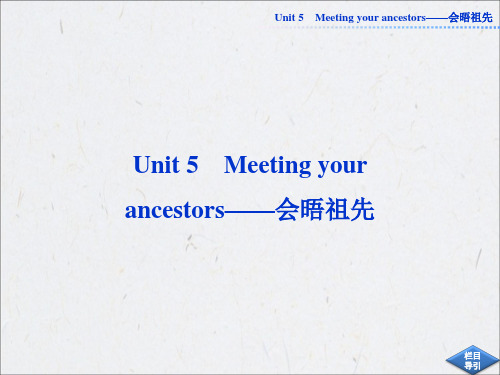
3....had done...when
when引导时间
状语从句,表“这时”。 She__________________(就要到达)her had almost reached
when destination________(这时)a delicious
smell arrested her progress and she stopped.
考点串讲讲练互动
单词精研
1alternative adj.供选择的;其他的
n.可能的选择;选择对象 ( 教 材 P37)Can you think of the alternatives we would use today? 你 能想到我们今天可供利用的办法吗?
栏目 导引
Unit 5
Meeting your ancestors——会晤祖先
Unit 5
Meeting your ancestors——会晤祖先
Unit 5
Meeting your
ancestors——会晤祖先
栏目 导引
Unit 5
Meeting your ancestors——会晤祖先
基础盘点自测自评
核心单词 1.When I got home,the house was a complete____________(混乱). mess 2.Be quiet!It is not polite
10.She used to suffer
from____________but now she is starvation starving ____________herself to try to lose weight.(starve)
栏目 导引
英语新选修八课件Unit5SectionⅢGrammar现在完成进行时
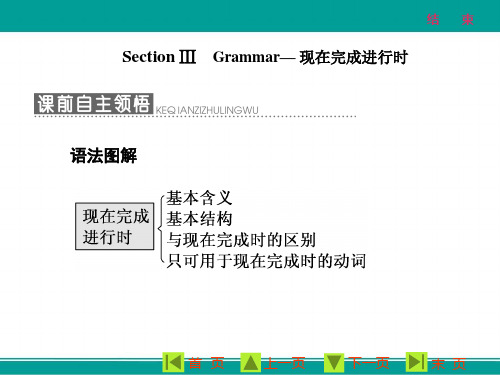
首页
上一页
下一页
末页
结束
三、有些动词不能用于现在完成进行时,但可用于现在完成 时,这些动词为:
状态动词:be, have, exist; 情感动词:like, love, hate; 感觉动词:see, hear, know, feel, sound; 短暂性动词:finish, marry, get up, come, go 等。 I have known him for years. 我认识他已经好几年了。 They have finished the work. 他们已经完成了这份工作。
我们一整个下午一直在打扫教室。
2.She has always been working like that.
她一贯是那样工作的。
3.I've been reading this book for two hours, but I haven't
finished it. 这本书我已经读了两个小时了,但我还没读
结束
二、现在完成进行时与现在完成时的区别 1.现在完成时强调动作的完成,而现在完成进行时强调动 作的延续或反复,因此,表示动作的完成,只能用现在完成 时,而不能用现在完成进行时。 I have written a book.(动作已经完成) 我已经写了一本书。 They have been building a bridge.(动作还将继续下去) 他们一直在建造一座桥。
首页
上一页
下一页
末页
结束
⑥I have visited my hometown recently, whose changes have left a deep impression on me. ⑦Recently she has always been helping me. ⑧Recently she has helped me a lot.
【高中英语教材知识梳理】选修八 Unit 5
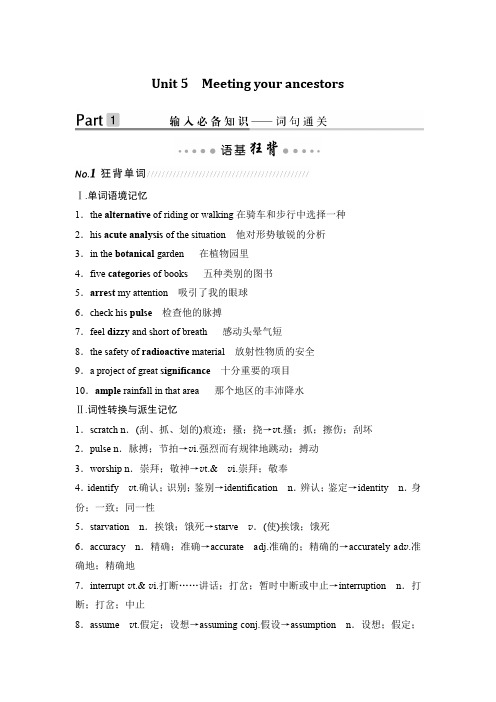
Unit 5Meeting your ancestorsⅠ.单词语境记忆1.the alternative of riding or walking在骑车和步行中选择一种2.his acute analysis of the situation 他对形势敏锐的分析3.in the botanical garden 在植物园里4.five categories of books 五种类别的图书5.arrest my attention 吸引了我的眼球6.check his pulse检查他的脉搏7.feel dizzy and short of breath 感动头晕气短8.the safety of radioactive material 放射性物质的安全9.a project of great significance十分重要的项目10.ample rainfall in that area 那个地区的丰沛降水Ⅱ.词性转换与派生记忆1.scratch n.(刮、抓、划的)痕迹;搔;挠→v t.搔;抓;擦伤;刮坏2.pulse n.脉搏;节拍→v i.强烈而有规律地跳动;搏动3.worship n.崇拜;敬神→v t.& v i.崇拜;敬奉4.identify v t.确认;识别;鉴别→identification n.辨认;鉴定→identity n.身份;一致;同一性5.starvation n.挨饿;饿死→starve v.(使)挨饿;饿死6.accuracy n.精确;准确→accurate adj.准确的;精确的→accurately ad v.准确地;精确地7.interrupt v t.& v i.打断……讲话;打岔;暂时中断或中止→interruption n.打断;打岔;中止8.assume v t.假定;设想→assuming conj.假设→assumption n.设想;假定;担任9.sharpen v.(使)锋利;尖锐;清晰;削尖→sharp adj.锋利的→sharpener n.磨具;削具;铅笔刀10.messy adj.凌乱的;脏的→mess n.凌乱;脏11.ripen v.使……成熟;成熟→ripe adj.成熟的12.systematic adj.有系统的;有计划的;有条理的→system n.系统;制度13.academy n.学院;学会;学术团体;院校→academic adj.学术的;理论的14.receptionist n.接待员;招待员→receive v.接收→reception n.接待;接收15.division n.划分;分割;分配;分界线→divide v.分开;分割;划分16.applaud v i.& v t.鼓掌欢迎;赞赏→applause n.鼓掌17.accelerate v.加速;促进→acceleration n.加速度18.skilful adj.有技巧的;熟练的→skilled adj.熟练的;有技能的→skill n.技能;技巧Ⅲ.单词趣味串记1.His acute observation made his research work accurate.他的敏锐的洞察力使他的研究工作十分准确。
选修8第五单元语法
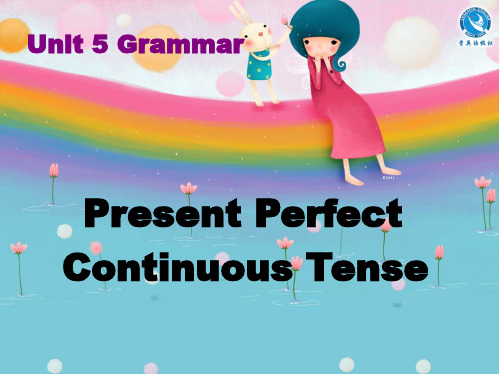
They _h_a_v_e__b_e_e_n_p_l_a_y_i_n_g_basketball all the time.
The boy __h_as__b_ee_n__re_a_d_in_g__a book for almost two hours.
Play games
They __h_a_ve__b_ee_n__p_la_y_in_g__games in the school for almost an hour.
2) 表重复。叙述从过去某时到现在或最 近一直重复的动作。如: 最近天气变化无常, 我时常感冒。 The weather has been changeable lately; I’ve been having a lot of colds. 3) 有感情色彩。如: 今天真是一个多事之日。
Too much has been happening today.
4. Now that she is out of job, Lucy ___ going back to school, but she hasn't decided yet. A. had considered B. has been considering C. considered D. is going to consider
5. The little boy is dirty from head to foot because he ___ in the mud all morning. A. has played B. is playing C. has been playing D. was playing
时态填空:
现在完成进行时和现在完成时的比较: A. 未完结性 I’ve cleaned the windows. 我把窗户擦干净了。
高中英语 选修八 Unit5
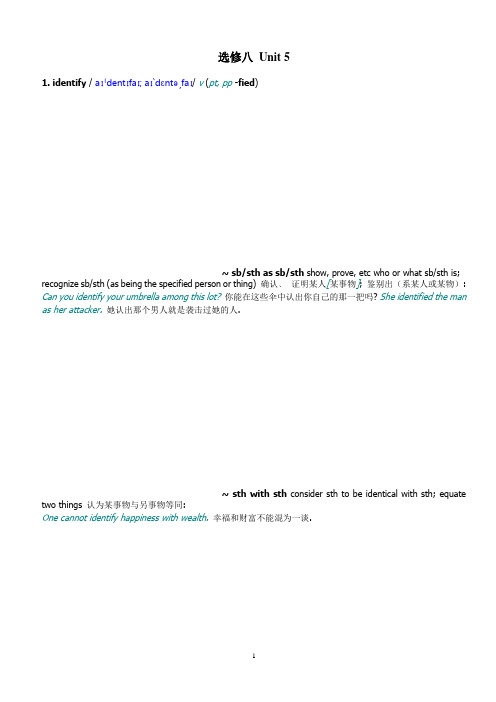
选修八Unit 51. identify/ aɪˈdentɪfaɪ; aɪˋdɛntəˏfaɪ/ v (pt, pp -fied)~ sb/sth as sb/sth show, prove, etc who or what sb/sth is; recognize sb/sth (as being the specified person or thing) 确认﹑证明某人[某事物]; 鉴别出(系某人或某物): Can you identify your umbrella among this lot? 你能在这些伞中认出你自己的那一把吗? She identified the man as her attacker. 她认出那个男人就是袭击过她的人.~ sth with sth consider sth to be identical with sth; equate two things 认为某事物与另事物等同:One cannot identify happiness with wealth. 幸福和财富不能混为一谈.~ with sb/sth to feel sympathy with someone or be able to share their feelings 认同某人或某物,与某人或某物有同感:He identified with our distress. 他体谅我们的痛苦。
2. alternative/ ɔːlˈtɜːnətɪv; ɔlˋtənətɪv/ adj [attrib 作定语]available in place of sth else; other 可用以代替其它事物的; 另一可选用的; 其他的:find alternative means of transport 另找一个运输方法Have you got an alternative suggestion? 你有没有其它的建议?> alternative n choice of two or more possibilities 可能性中的选择:You have the alternative of marrying or remaining a bachelor. 你可以结婚也可以仍做单身汉, 任你选择. Caught in the act, he had no alternative but to confess. 他被当场抓住, 除了招供别无出路.常见搭配:have no alternative but to do sth. (除……以外)别无选择there is no alternative…别无选择an alternative to 是……的替代物;可以代替3. interrupt/ ˏɪntəˈrʌpt; ˏɪntəˋrʌpt/ vbreak the continuity of (sth) temporarily 暂时中断或中止(某事物):Trade between the two countries was interrupted by the war. 两国间贸易因战争而中断. We interrupt this programme to bring you a news flash. 我们中断节目, 报告新闻快讯.~ (sb/sth) (with sth) (贬) stop (sb) speaking, etc or (sth) happening by speaking oneself or by causing some other sort of disturbance 打断(某人)讲话; 打岔; 打扰: Don't interrupt (me) while I'm busy! 我正忙着, 不要打搅我!4. acute/ əˈkjuːt; əˋkjut/ adj (-r, -st)very great; severe 极大的; 严重的: suffer acute hardship 遭受极大的苦难* There's an acute shortage of water. 严重缺水.(of feelings or the senses) keen; sharp; penetrating (指感觉或感官)敏锐的, 深刻的, 剧烈的:suffer acute pain, embarrassment, remorse, etc 感到剧烈的疼痛﹑极度的尴尬﹑深深的懊悔等Dogs have an acute sense of smell. 狗的嗅觉很敏锐.5. assume/ əˈsjuːm; US əˈsuːm; əˋsum/ vaccept (sth) as true before there is proof 假定; 假设; 设想; 以为:I am assuming that the present situation is going to continue. 我认为目前的情况将会继续下去.We must assume him to be innocent until he is proved guilty. 尚未证实他有罪, 就得假定他是清白的.> assumed adj [attrib 作定语] pretended; false 假装的; 假的:living under an assumed name使用假名字活着.6. regardless adv (infml 口) paying no attention to sb/sth 不加理会; 不顾:I protested, but she carried on regardless. 我极力反对, 但她置之不理仍一意孤行.regardless of prep paying no attention to (sb/sth); heedless of 不理会(某人[某事物]); 不顾: regardless of the consequences, danger, expense 不顾後果﹑危险﹑代价He continued speaking, regardless of my feelings on the matter. 他不顾及我在此事上的感情继续往下说.7. 关于cut的词组:cut down(a) cause sth to fall down by cutting it at the base (自基础部分)砍倒: cut down a tree砍倒一棵树.(b) reduce the length of sth; shorten sth 缩短某物; 删减某物: cut down a pair of trousers 把裤子改短(c) reduce the amount or quantity of sth; consume, use or buy less (of sth) 减少某事物的数额或数量; 减少消耗, 少用或少买(某物): cut down one's expenses 减少开支cut in(a) (of a vehicle or driver) move suddenly in front of another vehicle, leaving little space between the two vehicles (指车辆或司机)超车抢道:The lorry overtook me and then cut in (on me). 那辆卡车超越我的车後, 突然插入我前方的位置.(b)interrupt sb/sth 打断﹑打搅某人[某事物] cut in (on sb/sth); cut into sth:She kept cutting in on/cutting into our conversation. 我们谈话时她老是插嘴.cut off(a) cut sb off (a) (常用於被动语态) interrupt sb speaking on the telephone by breaking the connection 切断电话线路使某人通话中断:We were cut off in the middle of our conversation. 我们正交谈时, 线路被切断了.(b) cut sb/sth off (from sb/sth) (常用於被动语态) prevent sb/sth from leaving or reaching a place or communicating with people outside a place 切断某人[某事物]的去路或来路; 使某人[某事物]与外界隔绝:an army cut off from its base 与基地失去联络的军队The village was cut off (from the outside world) by heavy snow for a month. 村庄被大雪封住(而不能与外界联系)达一个月.cut out(a) (infml 口) leave sth out; omit sth 去掉或省略某事物:You can cut out the unimportant details. 你可以删掉不重要的细节.(b) (infml 口) stop doing, using or consuming sth 停止做某事; 停止使用或消耗某物:cut out sweets in order to lose weight为了减轻体重而戒食糖果.cut updivide sth into small pieces with a knife, etc 用刀等把某物分成小块; 切碎; 剪碎:cut up vegetables把蔬菜切碎.8.significance/ sɪgˈnɪfɪkəns; sɪɡˋnɪfəkəns/ n [U]meaning 意义; 意思: What is the significance of this symbol?这个符号是什麽意思?importance 重大意义; 重要性: a speech of great significance有重大意义的讲话Few people realized the significance of the discovery. 很少有人意识到这一发现的重要性.9. somehow/ ˈsʌmhau; ˋsʌmˏhaʊ/ (US also someway/ˈsʌmweɪ; ˋsʌmˏwe/) indef advin some way; by some means 以某种方式; 通过某种途径:We must stop him from seeing her somehow. 我们得想个办法不能让他再跟她来往.for a reason that is unknown or unspecified 由於未知的或未确指的原因:Somehow, I don't feel I can trust him. 不知什麽缘故, 我觉得不能信任他.10. fed up/ ˏfed ˈʌp; ˏfɛd ˋʌp/ adj [pred 作表语] ~ (with sb/sth) (infml 口) tired or bored; unhappy or depressed 厌倦; 厌烦; 不愉快; 沮丧:What's the matter? You look pretty fed up. 怎麽啦? 你显得那麽不高兴.I'm fed up with waiting for her to telephone. 我等她的电话都等得不耐烦了.11. wrinkle/ ˈrɪŋkl; ˋrɪŋkl/ n(usu pl 通常作复数) small fold or line in the skin, esp one of those on the face that are caused by age (皮肤上的)皱纹(尤指老人脸上的):She's beginning to get wrinkles around her eyes. 她眼角上开始出现皱纹了.raised fold in a piece of material, eg paper or cloth; small crease (材料上的)皱纹(如纸上或布上的; 小褶: She pressed her skirt to try to remove all the wrinkles. 她熨她的裙子, 想把褶儿都熨平.> wrinkle v (cause sth to) form wrinkles (使某物)形成皱纹或皱褶:The paper has wrinkled where it got wet. 这张纸湿的地方起皱褶了.12. pulse/ pʌls; pʌls/ n(通常作单数) regular beating of the arteries as blood is pumped through them by the heart, esp as felt at the wrist 脉搏: have a low, irregular, strong, weak, etc pulse 脉搏很慢﹑不规则﹑很强﹑很弱等[attrib 作定语] one's `pulse rate, ie the number of times per minute that one's heart beats, as felt at the wrist 脉率(按脉所得每分钟的心跳数).13. 关于look的词组:look ahead think about what is going to happen in the future 向前看; 为将来打算:Have you looked ahead to what you'll be doing in five years' time? 你是否想过五年後你要做些什麽?look forward to sth/doing sth anticipate sth with pleasure 欣然期待某事物:look forward to one's holidays, the weekend, a trip to the theatre 盼望放假﹑周末﹑去看戏We're so much looking forward to seeing you again. 我们非常盼望再见到你.look into sth investigate or examine sth 调查或观察某事物:A working party has been set up to look into the problem. 已成立工作组调查该问题.His disappearance is being looked into by the police. 他失踪一事警方正在调查.look out (used in the imperative 用於祈使句) be careful; watch out 小心; 当心:Look out! There's a car coming. 小心! 有辆汽车来了.look up (a) raise one's eyes 仰视: She looked up (from her book) as I entered the room. 我进屋时, 她(放下书)抬眼看了看.(b) search for (a word or fact) in a dictionary or reference book(在词典或参考书中)查阅(词或资料):If you want to know how a word is used, look the word up in the Advanced Learner's Dictionary. 要想了解某词的用法, 查《高阶词典》.Look up the time of the next train in the timetable. 查一下火车时刻表中下一趟车的时间.14.accelerate/ əkˈseləreɪt; əkˋsɛləˏret/ vmake (sth) move faster or happen earlier; increase the speed of 使(某事物)加快; 促进(某事物); 加速: accelerating the rate of growth提高生长率.move or happen more quickly 加速; 加快:The car accelerated as it overtook me.那辆汽车一加速就超越了我.> acceleration / əkˏseləˈreɪʃn; əkˏsɛləˋreʃən/ n [U]1 making or being made quicker; increase in speed 加快; 促进; 加速:an acceleration in the rate of economic growth经济发展速率的增长.2 (of a vehicle) ability to gain speed (指车辆)加速性能: a car with good acceleration加速性能良好的汽车.15.arrest/ əˈrest; əˋrɛst/ vseize (sb) with the authority of the law 依法逮捕, 拘留, 扣留(某人):After the match three youths were arrested. 比赛过後有三个青年被捕.attract (sth) 吸引(某事物): An unusual painting arrested his attention. 一幅异乎寻常的画引起了他的注意.16. date back to/from... have existed since 自某时代存在至今;追溯到:This castle dates (back) from the 14th century, ie was built then. 这座城堡建於14世纪.Our partnership dates back to (ie We have been partners since) 1960. 我们从1960年就合伙了.。
人教版选修八:Unit5+Meeting+your+ancestors+点击动词时态的用法+
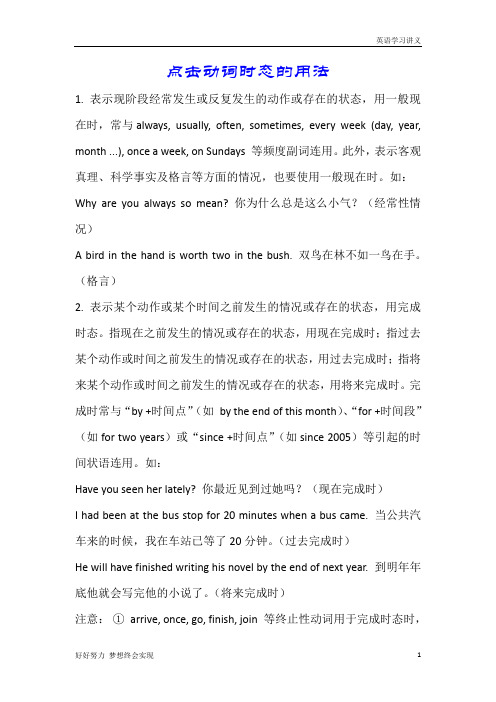
点击动词时态的用法1. 表示现阶段经常发生或反复发生的动作或存在的状态,用一般现在时,常与always, usually, often, sometimes, every week (day, year, month ...), once a week, on Sundays 等频度副词连用。
此外,表示客观真理、科学事实及格言等方面的情况,也要使用一般现在时。
如:Why are you always so mean? 你为什么总是这么小气?(经常性情况)A bird in the hand is worth two in the bush. 双鸟在林不如一鸟在手。
(格言)2. 表示某个动作或某个时间之前发生的情况或存在的状态,用完成时态。
指现在之前发生的情况或存在的状态,用现在完成时;指过去某个动作或时间之前发生的情况或存在的状态,用过去完成时;指将来某个动作或时间之前发生的情况或存在的状态,用将来完成时。
完成时常与“by +时间点”(如by the end of this month)、“for +时间段”(如for two years)或“since +时间点”(如since 2005)等引起的时间状语连用。
如:Have you seen her lately? 你最近见到过她吗?(现在完成时)I had been at the bus stop for 20 minutes when a bus came. 当公共汽车来的时候,我在车站已等了20分钟。
(过去完成时)He will have finished writing his novel by the end of next year. 到明年年底他就会写完他的小说了。
(将来完成时)注意:①arrive, once, go, finish, join 等终止性动词用于完成时态时,不可与表示时间段的状语连用,否则要改变句型或更换动词。
如:译:他们到达这里多久了?误:How long have they arrived here?正:How long have they been here?正:How long ago did they arrive here?正:How long is it / has it been since they arrived here?②hardly ... when, scarcely ... before, no sooner ... than均表示“一……就”,主句的谓语动词用过去完成时,从句的谓语动词用一般过去时。
- 1、下载文档前请自行甄别文档内容的完整性,平台不提供额外的编辑、内容补充、找答案等附加服务。
- 2、"仅部分预览"的文档,不可在线预览部分如存在完整性等问题,可反馈申请退款(可完整预览的文档不适用该条件!)。
- 3、如文档侵犯您的权益,请联系客服反馈,我们会尽快为您处理(人工客服工作时间:9:00-18:30)。
Book8Unit5语法导学案(A)学习目标:知识目标:掌握十大常用时态的基本用法及其被动结构。
能力目标:能够总结现在完成进行时和现在完成时、一般过去时和现在完成时的区别。
情感目标:自主、合作、探究,激情展示,大胆质疑,分享成果。
激发学生对语法的学习热情。
学习重点:掌握十大常用时态的基本用法及其被动结构。
学习难点:能够总结现在完成进行时和现在完成时、一般过去时和现在完成时的区别第一部分:预习案一:动词时态语态基本知识:二.例句呈现:请同学们在括号内写出各句所使用的时态。
1. I always sleep with the window open.( )2. I was reading an interesting book at this time yesterday.( )3.I will be having a gathering party with my friends at this time tomorrow.( )4.I saw the famous film Pearl Harbor yesterday evening.( )5.The plane takes off at 5 o’clock.( )6. He will arrive in Beijing tomorrow.( )7.The workers are building a garden these days.( )8.He has taught Chinese for 20 years.( )9.He told me that he had read the book twice.( )10.The boy has been reading a book for almost two hours. ( )11. He told me that he would take an important exam the next week. ( )我的疑惑:_______________________________________ _________________我的收获:_____________________________________ _______________第二部分:探究案探究一:1) 观察下面两组句子,理解它们的语法形式和语意。
Scene 1 (A girl complained to the boy who hurried up near to her breathlessly.)G: I have been waiting here for ages.B: I have been hurrying here all the wayScene 2 (You plan to play basketball with friends, but the rain is on and on.)Y: It has been raining all the morning2) 从38页课文中找出使用现在完成进行时的句子并理解其意义。
_____________________________________________________________________________________ _____________________________________________2. 用法归纳现在完成进行时的基本表达式_______ ______现在完成进行时表达的意义(一)表示从过去某时开始一直持续到_______的动作,并且还将持续下去。
The Chinese have been making paper for two thousand years.中国有2000年的造纸历史。
(动作还将继续下去)I have been learning English since three years ago.自从三年前以来我一直在学英语。
(动作还将继续下去)(二)表示在说话时刻之前到现在____________的动作。
We have been waiting for you for half an hour.我们已经等你半个钟头了(人还没到,如同在电话里说的,还会继续等)3)注意事项(1) 不能用现在进行时的动词,如be, have, like, love, know, see, hear等,也不能用现在完成进行时时态构成(以do为例)语态时间状语一般现在时do/does am/is/are+done sometimes,every day, always, often, on Sundays, usually, never一般过去时did was/were done yesterday, last week, three years ago, theother day, in 1990现在进行时am/is/are doing am/is/are being done look, now, at present,at this moment,these days过去进行时was/were doing was/were being done then, at this/ that time+过去时间, at...o’clock+过去时间, those days一般将来时will/shall do will/shall be done next week, tomorrow, before long, in the future, next week/month/year过去将来时would/should do would/should be done the next day/year/month现在完成时have/has done have/has been done Lately, recently, so far, yet, by now, up to now, since then, in the last/ past few days/years ,since+时间点,for+时间段过去完成时had done had been done by then, by that time, until then, by the end of 2012, before 1999,现在完成进行时have/has beendoing_________all this morning, these few days, allnight, this month, recently将来进行时will be doing _________ at this time tomorrow/the day after tomorrow, from...to...tomorrow里,而应用现在完成时。
例如:The poor child has been ill for a long time.译:___________________________________Have you seen her parents these days?译:______________________________________探究二:现在完成进行时与现在进行时比较:现在完成进行时强调某动作从过去一直延续到现在;而现在进行时只指目前正发生的动作。
试比较:Susan has been reading that storybook since last night.译:_________________ _ _______Susan is reading a storybook now.译:___________________________________ _______(3) 现在完成进行时和现在完成时比较:1)有些动词(如:work, study, live, teach等)用现在完成进行时与现在完成时意思差不多。
试比较:The teacher has been teaching at this school for ten years.The teacher has taught at this school for ten years.2)英语中的多数动词在这两种时态中表示不同的含义。
现在完成时如果不带表示一段时间的状语,就只能表示动作的完成,而现在完成进行时则表示动作的延续。
试比较:They have built a new lab.他们建了一座新实验室。
(表示动作的完成)They have been building a new lab (these years).这些年他们一直在建一座新实验室。
(表示动作还在继续)探究三:例句呈现:1.I have taught in the school since 1989.2.I taught in the school in 1989.3.I wrote a letter just now.4.I have written a letter.同学们你能根据例句总结现在完成进行时和现在完成时的区别吗?(学法指导:从重复性、持续性、感情色彩、时间状语等方面分析)_________________________________________________________________________________________________________________________________________________第三部分:训练案一:用所给动词的正确形式完成下列句子1. A: --- I am sorry I _________ (keep) you waiting so long.B: --- It is all right. I ________________ (read) the newspapers.2. The CCTV ____________________ (broadcast) English programmers ever since 1977.3.You _______ (feel) better when you __________ (take) the medicine.4. She said we __________ (may keep) the book as long as we _____ (like).5. Please wake me up if I ___ still _______ (sleep) when you _____ (come).6. My sister _______ (learn) English since she ____ (be) a child. She ___ (speak) English fluently now.7. My uncle ________ (come) to see us. He _______ (arrive) here a few days ago. I _________ (start) for Sydney tomorrow morning.8. He _____ (break) his glasses when he ___________ (play) in a football match.二:下列各句均有一处错误,请指出并改正。
